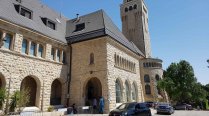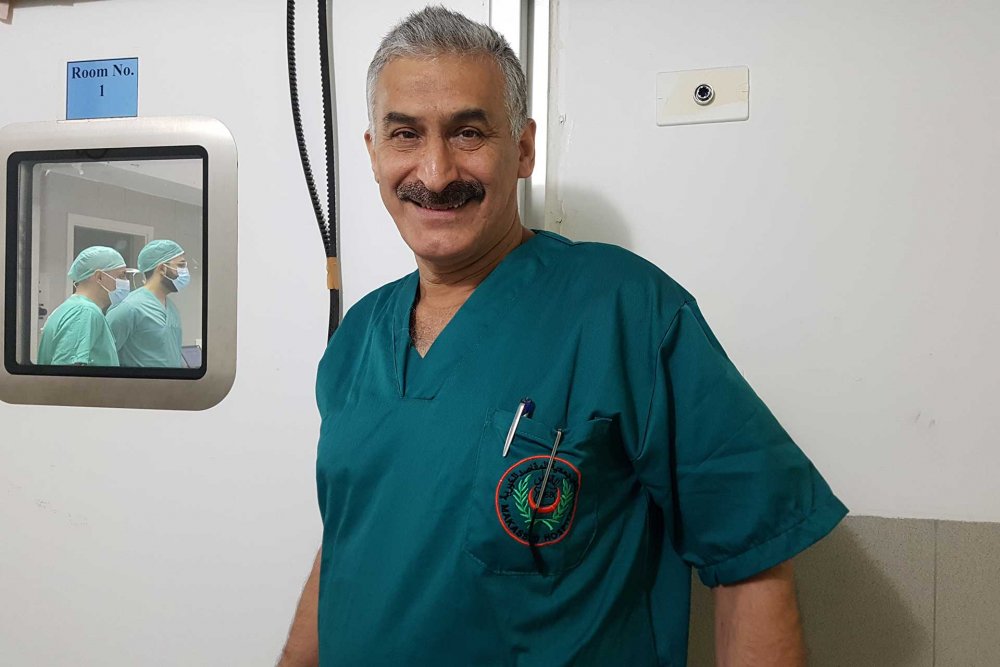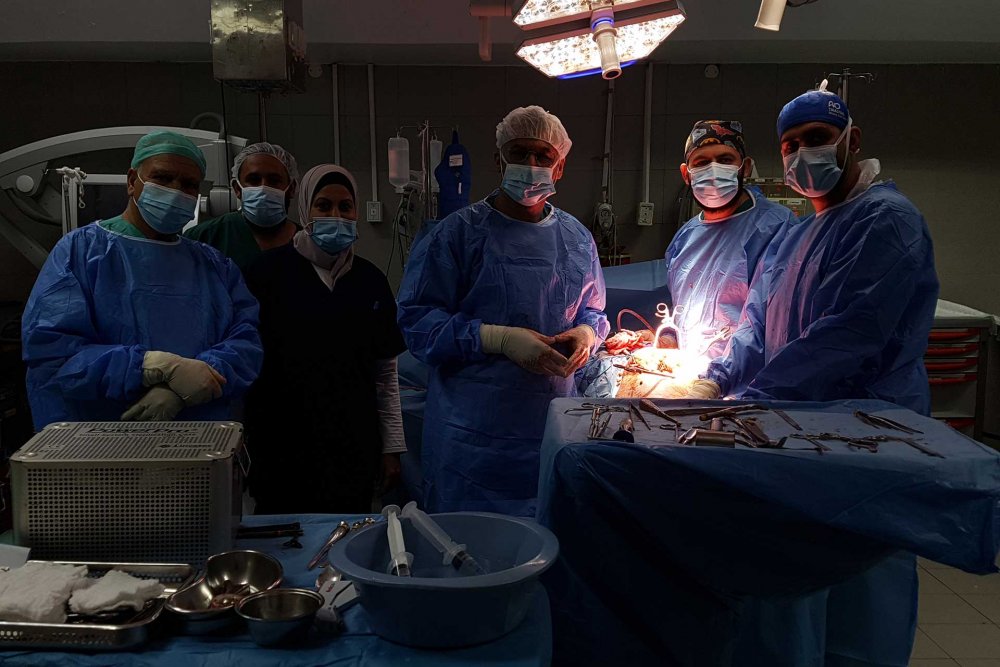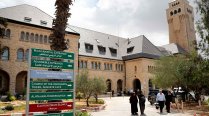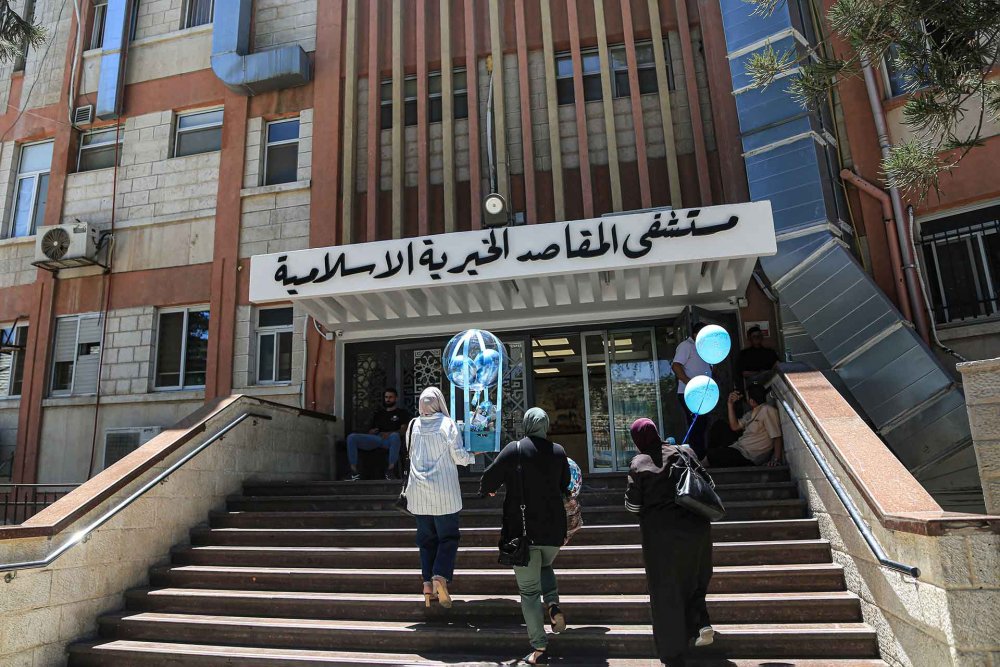Introduction
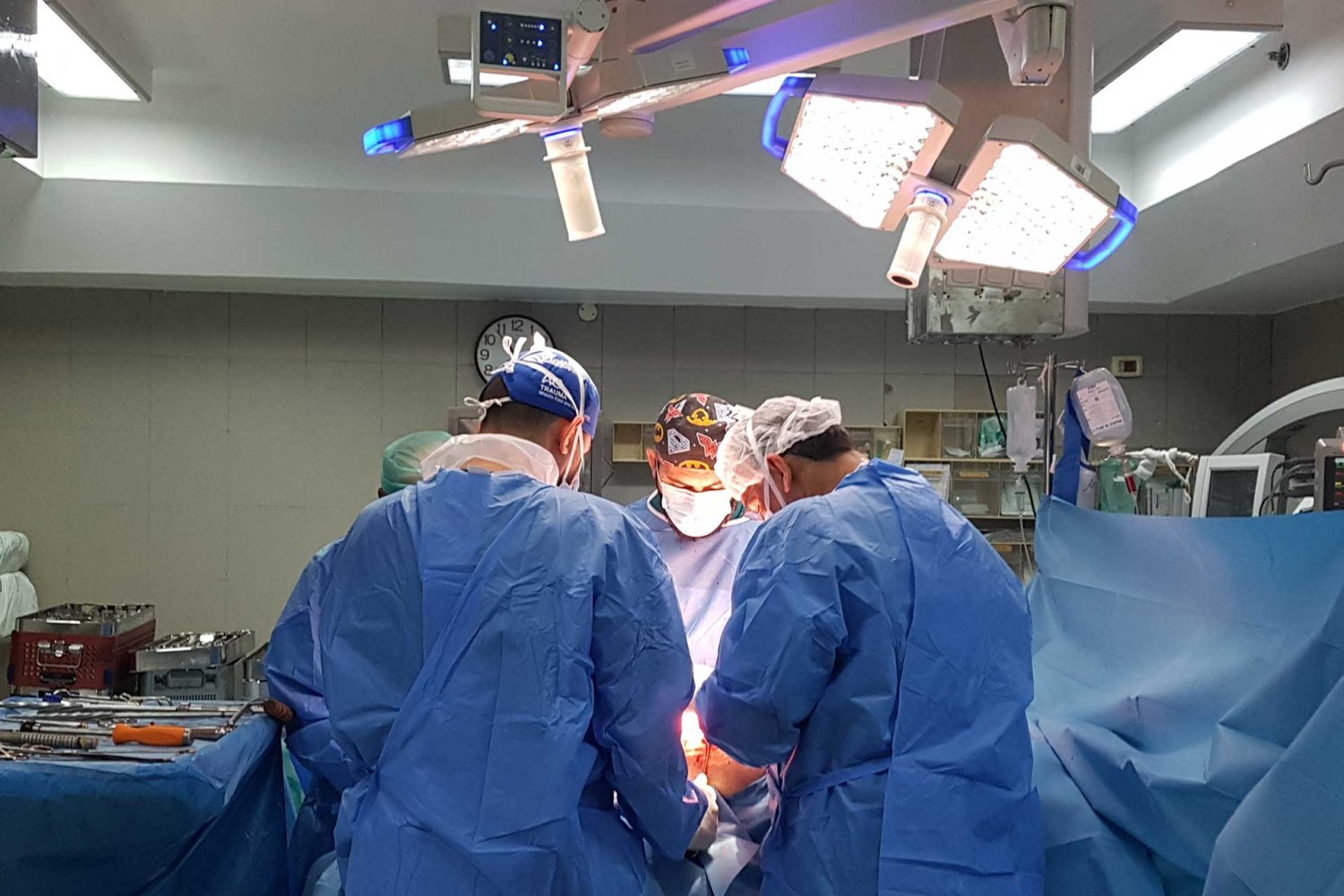
Credit:
Aseel Jundi for Jerusalem Story
Head of Surgery at Jerusalem’s Makassed Hospital: “Our Specialized Orthopedic Services Have Reduced the Need to Refer Palestinian Patients Abroad”
Snapshot
Makassed Hospital, one of East Jerusalem’s few Palestinian hospitals, is performing complex surgeries every day. Jerusalem Story spoke with the head of the surgery department, Dr. Hussam Abu Sa’a, to learn about the department and its work.
A 2021 European Union-funded study titled “East Jerusalem Healthcare Sector” reports that five hospitals in East Jerusalem collectively provide 651 beds. These beds serve Palestinians from the occupied West Bank (including East Jerusalem) and the Gaza Strip.1
The study found that in 2018, the five hospitals admitted 80,717 patients, treated 240,000 patients in outpatient clinics, received 58,530 emergency cases, handled 7,474 births, and conducted 16,365 surgeries.2
It also indicates that al-Makassed Islamic Charitable Society Hospital, located on the Mount of Olives, is the largest of these East Jerusalem hospitals, accounting for 35 percent of the total beds, followed by Augusta Victoria Hospital, with 23.9 percent of the beds.3
These hospitals are crucial for patients from the rest of the occupied West Bank and Gaza who are referred by the Palestinian Ministry of Health, because they offer specialized treatments that are otherwise unavailable in those areas. According to the Palestinian Ministry of Health, 36,414 patients were referred to East Jerusalem hospitals in 2017, representing 38 percent of the ministry’s external medical referrals.4
Jerusalem Story visited the Orthopedics Department at Jerusalem’s Makassed Hospital on October 30, 2024, where specialists and residents perform complex surgeries. They conduct between 10 and 17 surgeries daily, with most patients referred from various West Bank provinces and the Gaza Strip.
Jerusalem Story met with Dr. Hussam Abu Sa’a, an orthopedic surgery consultant and head of the surgery department at Makassed Hospital, for an in-depth conversation about his 26-year journey at this prominent Palestinian medical institution.
Jerusalem Story: To start off, who is Dr. Hussam Abu Sa’a?
Hussam Abu Sa’a (HA): I was born in 1963 in the village of Deir al-Ghusun in the Tulkarm district, north of the West Bank, to a middle-class family. My father was a farmer, and I often helped him with agricultural work when I was a child.
Working in this field was exhausting, which motivated me to excel in school so I could pursue a different path. I kept my grades high to secure a university scholarship, because my father couldn’t afford to pay for my education.
Through hard work, I achieved a 97 percent score [on the matriculation exams], qualifying me for a scholarship to study medicine in the Soviet Union, where I spent seven years. After returning to Palestine, I earned another scholarship to specialize in spinal surgery in France.
In 1998, I returned to Palestine, joined Makassed Hospital, and established the hospital’s orthopedic surgery training program.
I also serve as an associate professor at Al-Quds University’s Faculty of Medicine department and as vice chair of the Palestinian Medical Council’s examination committee. Additionally, I have been a member of both the examination and training committees of the Arab Medical Council for the past 10 years.
JS: Can you tell us about the history of orthopedic surgery in Jerusalem?
HA: When I arrived at Makassed, there was no dedicated orthopedic department—it was part of the general surgery department. I established the orthopedic department, developing surgical procedures I had learned in France. We started small and gradually built up a large department, which now consists of 10 resident doctors and 5 specialists who treat many patients.
Since 1998, two to three doctors have graduated each year from our program after completing five years of specialized orthopedic training, with two new residents accepted annually. We consistently have 10 residents in training, and approximately 30 to 40 orthopedic specialists who work in the West Bank and Gaza are graduates of our program, making up 70 percent of Palestine’s orthopedic surgeons. I’m also keen on sending doctors abroad for certifications in specialized surgeries after they complete their general surgery training at Makassed, enabling them to better serve Palestinian patients upon their return.
JS: Is orthopedic surgery available to Palestinians elsewhere, or is Makassed the only place they can receive this care, and do Israeli hospitals provide this care?
HA: Makassed’s department is one of the oldest orthopedic departments in Palestine and it is part of a main referral hospital, treating complex and critical cases that other Palestinian hospitals lack the expertise or equipment to address. We have reached a stage where the Palestinian Ministry of Health no longer refers orthopedic cases abroad; instead, all complex cases are sent to Makassed without referrals to Israeli hospitals.
JS: What are the distinguishing features of your surgeries?
HA: We perform all types of orthopedic surgeries. Our department is the only one in Palestine that deals with bone cancer surgeries and specializes in sports medicine procedures. It’s also the only one conducting full-body arthroscopies, including hand, ankle, and elbow joints.
JS: We understand that many patients are referred to you after failed surgeries elsewhere. Are these cases more challenging?
HA: Absolutely. Most cases referred to us are the ones that can’t be surgically handled at other hospitals. We call these “reconstructive” or “revision” surgeries, as these patients have often undergone one or two failed surgeries due to lack of equipment or expertise. We are distinguished by our ability to address complex issues resulting from failed surgeries.
JS: How many surgeries do you perform daily, and which type of orthopedic surgery is most common at Makassed?
HA: We perform a minimum of 10 surgeries each day, reaching up to 17 at times, and utilizing several operating rooms. We handle all types of cases, from fractures and congenital deformities in children, to sports injuries. We also perform shoulder, knee, ankle, and hip joint surgeries, as well as spinal deformity corrections and complex bone tumor treatments.
We are the only hospital dealing with bone tumor cases in Palestine. Before we had this department, patients with bone tumors, such as knee cancer, often required leg amputation. Now, we can remove the tumor, install a prosthetic joint, and save the limb.
JS: Three years ago, you performed a “bilateral scapular winging” surgery on a 10-year-old child—a rare procedure and the first in Palestine. Could you tell us more about that case?
HA: “Bilateral scapular winging” is a rare condition caused by dysfunction in the muscle that stabilizes the shoulder blade against the rib cage. A child from Bethlehem had severe grade 4 shoulder winging, which made him unable to use his arm.
We prepared carefully for this rare procedure, as only 28 such surgeries had been performed worldwide before ours, making ours the 29th one. Despite limited resources, we performed the surgery on the child, and the operation was a success. We followed up with him and published the results in top medical journals. I still receive invitations from hospitals in the United States, France, and other countries to lecture about this successful and rare surgery, which involved multiple stages and significant challenges.
JS: The shortage of resources is not the only challenge facing Makassed Hospital. Since the beginning of the ongoing war on Gaza, patients from the West Bank and Gaza Strip have struggled to reach the hospital. Can you explain the impact of delayed surgeries on patients’ health?
HA: It’s widely known that patients face significant challenges reaching Makassed due to security issues and the difficulty of obtaining entry permits to Jerusalem, which often disrupts surgery schedules. There’s no doubt that delayed access can be life-threatening, particularly for cancer patients, whose lives are put at risk by such delays. We work closely with the coordination and permit issuance department to ensure timely treatment for all patients, and in cases of delay, we cooperate with all parties despite scheduling challenges.
JS: What are the biggest challenges facing your department and hospital?
HA: Our biggest challenges are financial matters. We suffer from a severe shortage of essential medical supplies, such as fracture fixation devices, prosthetics for upper and lower limbs and spines, and equipment for hip and shoulder joint replacement, as well as supplies for tumor surgeries and sports injuries. We also lack basic equipment needed for operating rooms.
JS: Have you devised a plan to receive injured patients from the ongoing Gaza war, especially if the war ends and large numbers of patients flow to Makassed?
HA: Yes, we do have a plan in place, but we are short on equipment and supplies.
JS: Can you discuss the teaching and training aspect of Makassed’s Orthopedic Department?
HA: The Orthopedics Department at Makassed serves as a teaching and training center, staffed by five specialists in fields such as joint surgery, pediatric orthopedics, spinal surgery, arthroscopy, sports injuries, and bone tumors. This expertise qualifies us to address any orthopedic issue. We also host fourth-year medical students from the Faculty of Human Medicine at Al-Quds University on a monthly basis and offer them a tailored educational and training program, along with exams.
JS: You have received job offers from Israeli and international hospitals, yet you chose to stay and work at Makassed Hospital despite the fluctuating salaries, sometimes even with none. Why?
HA: (Smiling) I studied and worked hard to reach this point, for which I’m grateful; however, my goal has always been to serve my people, train Palestinian doctors, and teach medical students. Despite the difficult circumstances, my vision and goals remain unchanged.
Notes
Asma Imam and Motasem Hamdan, Study of East Jerusalem: Healthcare Sector (Jerusalem: The Union of Charitable Societies—Jerusalem, January 2021), viii.
Imam and Hamdan, Study of East Jerusalem, 30.
Imam and Hamdan, Study of East Jerusalem, 3.
Imam and Hamdan, Study of East Jerusalem, 4.

